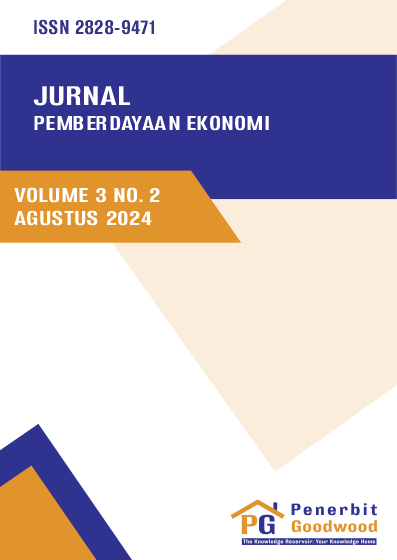Article Details
Vol. 3 No. 2 (2024): Agustus
Penyuluhan Pembuatan Dodol Kolang-Kaling di Kecamatan Gedong Tataan Kabupaten Pesawaran
Purpose: This study aims to enhance the income of housewives through kolang-kaling dodol production training.
Methodology/approach: The kolang-kaling dodol training was held in Gedong Tataan Subdistrict, Pesawaran Regency, and involved housewives from the local PKK community group. The training aimed to improve their skills in processing kolang-kaling into a valuable product to help increase household income. It also encouraged creativity in utilizing local resources.
Results/findings: The dodol kolang-kaling production training in Gedong Tataan District received a positive response from PKK housewife members, with 8 out of 12 participants actively taking part in the activity. The participants showed great enthusiasm in learning about processing, packaging, and the potential market value of dodol kolang-kaling as a healthy and economically valuable food product.
Conclusion: The dodol kolang-kaling production training held in Gedong Tataan District, Pesawaran Regency, successfully enhanced the knowledge, skills, and entrepreneurial spirit of housewives who are members of the PKK. Through this training, participants not only acquired technical skills in processing and packaging products, but also gained an understanding of the economic potential of kolang-kaling as a healthy and marketable alternative food ingredient.
Limitations: The limited number of active participants only 8 out of 12 PKK members was one of the constraints in this training. This was due to some participants having other work obligations as educators, preventing them from fully engaging in the entire training session.
Contribution: This training contributed to enhancing household economic resilience by equipping participants with practical skills and entrepreneurial insight through the utilization of local food resources.
- Abareshi, M. (2025). Investigating employer perspectives on the polytechnic sector's industrial training program: A case study of iranian companies. Annals of Management and Organization Research, 6(3), 181-202. https://doi.org/10.35912/amor.v6i3.2246
- Abas Sunarya (2010).kewirausahaan .Yogyakarta: C.V Andi Offset. Buchari Alma (2007). Kewirausahaan.Bandung: Alfabeta
- Abrigo, J. N. F., Abrogena, A. A. A., Alcantara, D. R. E., De Gracia, N. A. V., Juliano, A. C., & Ador, Z. I. (2024). A narrative research of experiences of STEM teachers pursuing doctoral degree. Journal of Social, Humanity, and Education, 4(3), 153-168.
- Alizadeh, A., & Behfar, S. (2013). Properties of collagen based edible films in food packaging: a review. doi:http://scholarsresearchlibrary.com/archive.html
- Astuti, R. D., Balqiah, T. E., & Yuliati, E. (2024). Role of individual entrepreneurial orientation and innovation in SME performance: Gender perspectives. Problems and Perspectives in Management, 22(2), 365. doi:https://doi.org/10.21511/ppm.22(2).2024.28
- Biswas, S. (2021). She Innovates-Female owner and firm innovation in India. arXiv preprint arXiv:2109.09515. doi:https://doi.org/10.48550/arXiv.2109.09515
- Emen Suherman (2015),Business Entrepreneur,Bandung: Penerbit Alfabeta
- Gentile, L. (2020). Protein–polysaccharide interactions and aggregates in food formulations. Current Opinion in Colloid & Interface Science, 48, 18-27. doi:https://doi.org/10.1016/j.cocis.2020.03.002
- Hendro (2011).Dasar-dasar kewirausahaan.Jakarta: Erlangga
- Hermawan, W., Respationo, S., Erniyanti, E., & Fadlan, F. (2022). Juridical analysis of the involvement of the Indonesian National Army in countering criminal acts of terrorism criminal acts of terrorism. Dynamics of Politics and Democracy, 2(1), 11-21. https://doi.org/10.35912/dpd.v2i1.1803
- Hossain, A., Khatun, M., & Shanjabin, S. (2023). Impact of person-job fit and person-organization fit on employee engagement: Moderating role of supervisor support. Annals of Human Resource Management Research, 3(2), 97-114. https://doi.org/10.35912/ahrmr.v3i2.1885
- Hsu, C.-c., Chen, S.-H., & Feng, X.-c. (2024). Analysis of Product Quality and Customer Satisfaction: A Case Study of the Automotive Parts Industry. International Journal of Financial, Accounting, and Management, 6(2), 245-259. https://doi.org/10.35912/ijfam.v6i2.2153
- Khan, M. R., & Hossain, S. S. (2021). Perception of distance learning in Bangladeshi tertiary education: Prospects and obstacles in the Covid-19 era. Journal of Social, Humanity, and Education, 1(3), 197-207. https://doi.org/10.35912/jshe.v1i3.532
- Khaneghahi, S., Nasripour, F., & MahmoudZehi, M. A. (2022). Investigating the relationship between e-learning and mobile learning on students' academic self-handicapping during the outbreak of COVID-19. Journal of Social, Humanity, and Education, 2(3), 269-281. https://doi.org/10.35912/jshe.v2i3.1051
- Mammen, J., Alessandri, T. M., & Weiss, M. (2021). The risk implications of diversification: Integrating the effects of product and geographic diversification. Long Range Planning, 54(1), 101942. doi:http://dx.doi.org/10.1016/j.lrp.2019.101942
- Mari, M., Poggesi, S., Abatecola, G., & Essers, C. (2024). Women entrepreneurs and innovation: Retrospect and prospect. Journal of Innovation & Knowledge, 9(3), 100519. doi:https://doi.org/10.1016/j.jik.2024.100519
- Mullally, C., Janzen, S., Magnan, N., Sharma, S., & Shrestha, B. (2022). Can mobile technology improve female entrepreneurship? evidence from Nepal. arXiv preprint arXiv:2206.03919. doi:https://doi.org/10.48550/arXiv.2206.03919
- Mulyadi Nitisusastro (2015).Kewirausahaan & manajemen usaha kecil,Bandung :Penerbit Alfabeta
- Mwosi, F., Eton, M., Aluonzi, B., Olupot, S. P., & Alia, R. (2024). Business partnership, women empowerment and support to women living with HIV/AIDS in Kabale, Uganda. Journal of Sustainable Tourism and Entrepreneurship, 6(1), 15-29. https://doi.org/10.35912/joste.v6i1.2208
- Owusu, E., Akomeah, C. B., & Duah, F. (2021). Demographic differences in sources of stress in higher educational institutions in Ghana. International Journal of Financial, Accounting, and Management, 3(1), 27-44. https://doi.org/10.35912/ijfam.v3i1.476
- Sihombing, N., Elma, M., Thala’Ah, R., Simatupang, F., Pradana, E., & Rahma, A. (2022). Garlic essential oil as an edible film antibacterial agent derived from Nagara sweet potato starch applied for packaging of Indonesian Traditional Food-Dodol. Paper presented at the IOP Conference Series: Earth and Environmental Science.
- Suryana,(2013) Kewirausahaan kiat dan proses menuju sukses,Salemba empat Jakarta
- Tambunan, T. T. H. (2017). Women entrepreneurs in MSEs in Indonesia: their motivations and main constraints. JWEE(1-2), 56-86. doi:http://dx.doi.org/10.15640/ijgws.v5n1a9
- Yusuf,N.(1997).Kewirausaha,inovasi dan bisnis kecil.Modul
- Zhu, L., Spachos, P., Pensini, E., & Plataniotis, K. N. (2021). Deep learning and machine vision for food processing: A survey. Current Research in Food Science, 4, 233-249.

This work is licensed under a Creative Commons Attribution-ShareAlike 4.0 International License.

